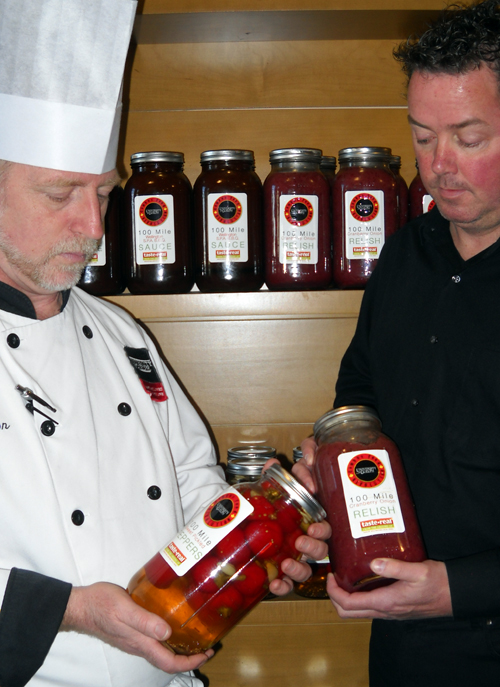
That new patty-press machine in Creelman Hall will help pump out more homemade hamburger patties for hungry campus members and visitors – and help U of G meet a local food challenge this year.
So says Mark Kenny, purchasing co-ordinator with Hospitality Services. Standing in a processing room in Creelman, he watches as chef Gordon Cooledge loads up the machine with fresh ground beef and prepares to crank out more patties destined for the 100 Mile Grille in Creelman and other campus food outlets.
Hospitality Services bought the patty press — and a smoker for turning out everything from smoked mushrooms and Ontario cheeses to ribs and perch – with a $15,000 grant under this year’s Local Food Challenge led by the Greenbelt Fund.
The department will focus on sourcing local protein for more burgers, meatballs and sausages made on-site instead of using prefabricated frozen ingredients and imported meat products. The new press can turn out about 1,200 patties an hour.
The annual challenge, now in its second year, is intended to help public-sector institutions such as schools, hospitals, long-term care facilities and childcare centres incorporate more Ontario food into their menus.
It’s the second time U of G has applied for the program. This year, Guelph was among 10 organizations to receive support. Others include Wilfrid Laurier University, the University of Toronto Scarborough campus and St. James Catholic High School in Guelph.
The funding will help Hospitality Services track its purchases, promote its products to customers and share progress through social media and through the unit’s online local sustainability plan.
The challenge reflects growing consumer demand for locally grown and produced foods, from meats to produce, says Kenny.
Writing about recent changes in campus food service in the spring issue of Edible Toronto, he says, “Hospitality Services has purchased equipment to manufacture its own hamburger patties using 100-per-cent locally raised beef, pork and lamb, and to smoke whole cuts of Ontario meats for use in many of its foodservice operations across campus. Smoked local cheeses, fish and other unique menu items will find their way onto our plates throughout the semesters.”
Upstairs in Creelman, Kenny points to the menu options at 100 Mile Grille, one of the outlets serving the dining hall. “There’s nothing in that burger except local ground beef,” he says.
Further, a condiment canning project sees local produce used to make burger toppings, sauces, ketchup, salsa, relish and other products for 100 Mile Grille. Those preserved condiments occupy two 10-foot-high shelving units called the “100 Mile Wall of Fame.”
Rows of jars are labelled as U of G products under the Taste Real – Guelph Wellington Local Food initiative. Hospitality Services is one of the 120 Taste Real partners, including regional farmers, wholesalers, businesses and restaurants intended to promote local food in the region.
Back downstairs in Creelman, a produce processing facility allows U of G to buy large amounts of locally grown fruits and vegetables for processing and storage in freezers and other facilities for use year-round. Funding for that project came two years ago from the Friends of the Greenbelt Foundation.
Last year, Cooledge and his team made everything from peach salsa from Niagara peaches, to kimchi made from Elmira cabbage, to Wellington Beer BBQ sauce, says Kenny. Produce comes from local farmers as well as U of G’s research stations, the Elmira Produce Auction Co-op and Don’s Produce in Cambridge, Ont.
Referring especially to the research stations, Kenny says, “We’re putting university-grown food on university students’ plates. That’s a rarity.”
A self-described lifelong foodie, he has visited campus classrooms as a guest lecturer on local food projects and the department’s sustainability measures.
With many students now away from campus, Hospitality Services will find a different market in conference delegates and catering. They prepare and serve local food for weddings, banquets and full-service conferences through the summer.
That’s a new challenge, he says: “Can we incorporate burgers into those menus?”
For more information about this year’s local food challengers, visit OntarioFresh.ca.